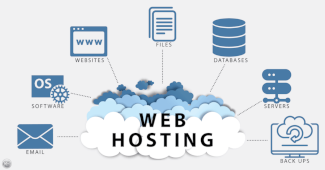Understanding Website Hosting
 Website hosting is a crucial aspect of establishing and maintaining an online presence. Whether you’re launching a personal blog, a business website, or an e-commerce platform, choosing the right hosting service is key to ensuring your site’s performance, security, and accessibility. In this article, we’ll explore what website hosting is, the different types available, and how to choose the best option for your needs.
Website hosting is a crucial aspect of establishing and maintaining an online presence. Whether you’re launching a personal blog, a business website, or an e-commerce platform, choosing the right hosting service is key to ensuring your site’s performance, security, and accessibility. In this article, we’ll explore what website hosting is, the different types available, and how to choose the best option for your needs.
What is Website Hosting?
Website hosting refers to the service that allows individuals or organizations to make their websites accessible on the Internet. When you create a website, all of its files, images, and other data need to be stored on a server, which is a powerful computer designed to manage multiple users and high levels of traffic. Hosting providers offer the space on their servers and the technology required to keep your site up and running 24/7.
Types of Website Hosting
There are several types of website hosting, each catering to different needs and budgets. Understanding the differences can help you choose the best hosting plan for your site.
-
Shared Hosting:
Shared hosting is the most common and affordable type of hosting. Multiple websites share the same server and its resources, such as CPU, RAM, and storage. This is a cost-effective solution for small businesses, personal blogs, or websites with low to moderate traffic. However, shared hosting can lead to slower loading times if other sites on the server experience high traffic.
-
VPS Hosting:
Virtual Private Server (VPS) hosting provides a middle ground between shared and dedicated hosting. In VPS hosting, a physical server is divided into multiple virtual servers, each with its own dedicated resources. This means you’ll have more control and better performance compared to shared hosting. VPS is ideal for growing websites that require more resources and customization options.
-
Dedicated Hosting:
With dedicated hosting, you rent an entire server exclusively for your website. This option provides the highest level of performance, security, and control, as you have full access to all the server’s resources. Dedicated hosting is best suited for large websites with high traffic, such as e-commerce sites, enterprise-level applications, or websites that require extensive resources.
-
Cloud Hosting:
Cloud hosting utilizes a network of interconnected servers to host websites. This type of hosting offers scalability and reliability, as your website’s resources can be scaled up or down depending on the traffic load. Cloud hosting is an excellent choice for websites that experience variable traffic levels or need high availability.
-
Managed Hosting:
Managed hosting services handle all the technical aspects of maintaining your server, including updates, security, and backups. This allows you to focus on your website’s content and functionality without worrying about server management. Managed hosting is available for various types of hosting, including shared, VPS, and dedicated options.
Key Factors to Consider When Choosing Website Hosting
Selecting the right hosting provider involves considering several factors to ensure your website performs optimally and meets your specific needs.
-
Performance and Speed:
The speed at which your website loads is critical for user experience and SEO. A reliable hosting provider should offer fast server response times and high uptime guarantees (typically 99.9% or higher). Check for hosting plans that provide SSD storage, content delivery networks (CDNs), and other features that can boost site speed. See Wikipedia page.
-
Scalability:
As your website grows, your hosting needs may change. Choose a hosting provider that offers scalable solutions, allowing you to upgrade your resources as your traffic increases. Cloud hosting and VPS are particularly good options for scalability.
-
Security:
Website security is essential, especially if you handle sensitive data or online transactions. Look for hosting providers that offer robust security features, including SSL certificates, firewalls, regular backups, and malware protection.
-
Support:
Reliable customer support is crucial, especially if you’re not technically inclined. Choose a hosting provider that offers 24/7 support through various channels like live chat, email, and phone. Responsive support can be invaluable when you encounter issues that need immediate attention.
-
Cost:
Website hosting costs vary depending on the type of hosting and the features included. While shared hosting is the most affordable, it may not offer the performance needed for high-traffic websites. It’s important to balance cost with the features and resources your website requires.
Summary
Website hosting is the foundation of your online presence, directly impacting your site’s performance, security, and reliability. By understanding the different types of hosting and the key factors to consider, you can make an informed decision that supports your website’s needs and future growth. Whether you’re just starting or managing a large online platform, choosing the right hosting service is essential for long-term success.
We provide website hosting as part of all our packages. Give us a chance to show you what wecan do here
